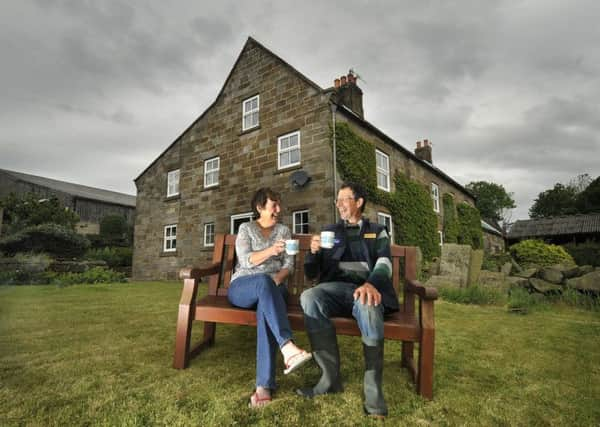Farm of the Week: Co-operative way to make Moors farms pay


Rob ventures to the mart with store cattle, particularly for the well respected North East Yorkshire Suckled Calf Association sales in spring and autumn and buys tups for his flock at the major sales held there too, but lambs destined for the meat market changed course eight years ago when he and fellow sheep men from the North York Moors set up the Seven Hill Farmers co-operative.
“We have around 300 moors sheep, mostly Scottish Blackface with some Swaledales, and around 160 Mules bred from the moor sheep, which we put to the Suffolk or Texel tup to produce fat lambs. We hadn’t had Suffolks for a while as a few years ago there was more demand for white-faced sheep such as the Texel and Charollais but the Suffolks have also improved and there is now increased demand for them. We lamb from March to early May, so we have a lot of lambs on the ground at the moment.
Advertisement
Hide AdAdvertisement
Hide Ad“Nearly all our marketed lamb now goes through Seven Hill Farmers. I’m one of seven directors and what we started sees us with over 30 North York Moors sheep farmers involved today. We needed to find a market for Mule wether lambs and hill lambs that were not in prime demand at a livestock market. We can sell at a good price at Ruswarp but not until late in the season when the early lambs are out of the way, so we looked for the right relationship with a processor where we could supply the kind of numbers that would be needed every week.
“We started off selling 1,500 lambs a year to Welsh Country Foods in Anglesey who were supplying Asda. When that slaughterhouse closed our buyer moved to St Merryn Meats in South Wales and that’s where most of our lambs go today, with others going to ABP in Dorset. Our lamb meets the needs of what the processors want and is now going into Tesco and for export. We supplied 15,000 lambs last year. The truck arrives here every fortnight from September to March taking anywhere between 40-60 lambs. The price still varies but isn’t quite as up and down as at market, plus we know what price we’re going to get before they go.”
Suckler cows have played a part at Intake since Rob’s parents Henry and Joyce moved to the farm in 1971.
“In the past we reared bull beef but moved away from that due to changes in the CAP. We had been growing some barley, but now we are permanent grassland with about 20 acres of woodland primarily for shelter belts, but also useful for a bit of fencing. We run a herd of 60 suckler cows with a mix of our own Simmental X cows plus Limousin and Angus X. We have two bulls – a Simmental and an Angus. The Angus is good for putting on to the Simmental heifers.
Advertisement
Hide AdAdvertisement
Hide Ad“We sell the majority of our calves as stores, going at around 10-12 months at Ruswarp and occasionally fat cattle to Dawn Meats in Carnaby. Bullocks go there at 18-20 months and heifers at two years. Our calving takes place either in February/March or September/October. While we trade our lambs as Seven Hill Farmers away from the market I still value the live auction system and support Ruswarp as much as we can. The livestock market sets the price.”
Less Favoured Area status and other land classed as disadvantaged tells its own story of the limitations Rob and Judith have in undertaking much else beyond sheep and cattle, but while their farmland may be regarded as such they would both be the first to point to their location having worked out as a tourist favoured area.
Littlebeck is one of the most inauspicious of dales, but at the same time a challenging drive for the Moors virgin and an enchanting experience. It comprises of a sporadic collection of houses with Little Beck running through the bottom and the Methodist chapel at the foot of Intake Farm, which was built on land given by Rob’s great grandfather Henry in 1890. Rob is a lay preacher in the Whitby circuit and leads worship there.
Twenty years ago Judith took the farm into the tourism market when she started with bed and breakfast accommodation. Today she runs three rooms and their guests are mostly those taking on the Coast to Coast walk, they’re in the official guide book as a stop over, and others who come for a longer and more leisurely stay who find Intake farm through their only advertisement in the Christian Holiday Handbook.